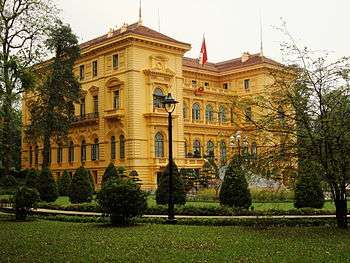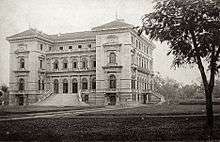Presidential Palace, Hanoi
The Presidential Palace of Vietnam (Vietnamese: Phủ Chủ tịch) located in the city of Hanoi, was built between 1900 and 1906 to house the French Governor-General of Indochina.
| Presidential Palace | |
|---|---|
| Native name Vietnamese: Phủ Chủ tịch | |
 | |
| Location | Ba Đình District, Hanoi, Vietnam |
| Built for | Governor-General of French Indochina |
| Architect | Auguste Henri Vildieu |
| Architectural style(s) | French Colonial, Italian Renaissance |

History
It was constructed by Auguste Henri Vildieu, the official French architect for French Indochina. Like most French Colonial architecture, the palace is pointedly European. The only visual cues that it is located in Vietnam at all are mango trees growing on the grounds.
The yellow palace stands behind wrought iron gates flanked by sentry boxes. It incorporates elements of Italian Renaissance design, including:
- aedicules
- a formal piano nobile reached by a grand staircase
- broken pediments
- classical columns
- quoins
When Vietnam achieved independence in 1954, Ho Chi Minh was claimed to have refused to live in the grand structure for symbolic reasons, although he still received state guests there, he eventually built a traditional Vietnamese stilt house and carp pond on the grounds. His house and the grounds were made into the Presidential Palace Historical Site in 1975.
The palace hosts government meetings. It is not open to the public, although one may walk around the grounds for a fee.
The Ho Chi Minh Mausoleum is located nearby the palace.
- House No. 54 where President Ho Chi Minh lived and worked from 1954 to 1958
 Carp pond on the grounds of the palace
Carp pond on the grounds of the palace Presidential Palace
Presidential Palace- Dining room of Ho Chi Minh's house attached to the Presidential Palace.
- Bedroom of Ho Chi Minh's house attached to the Presidential Palace.
See also
- Tonkin Palace in Hoàn Kiếm District built between 1915 and 1916 to house the governor of Tonkin

.jpg)